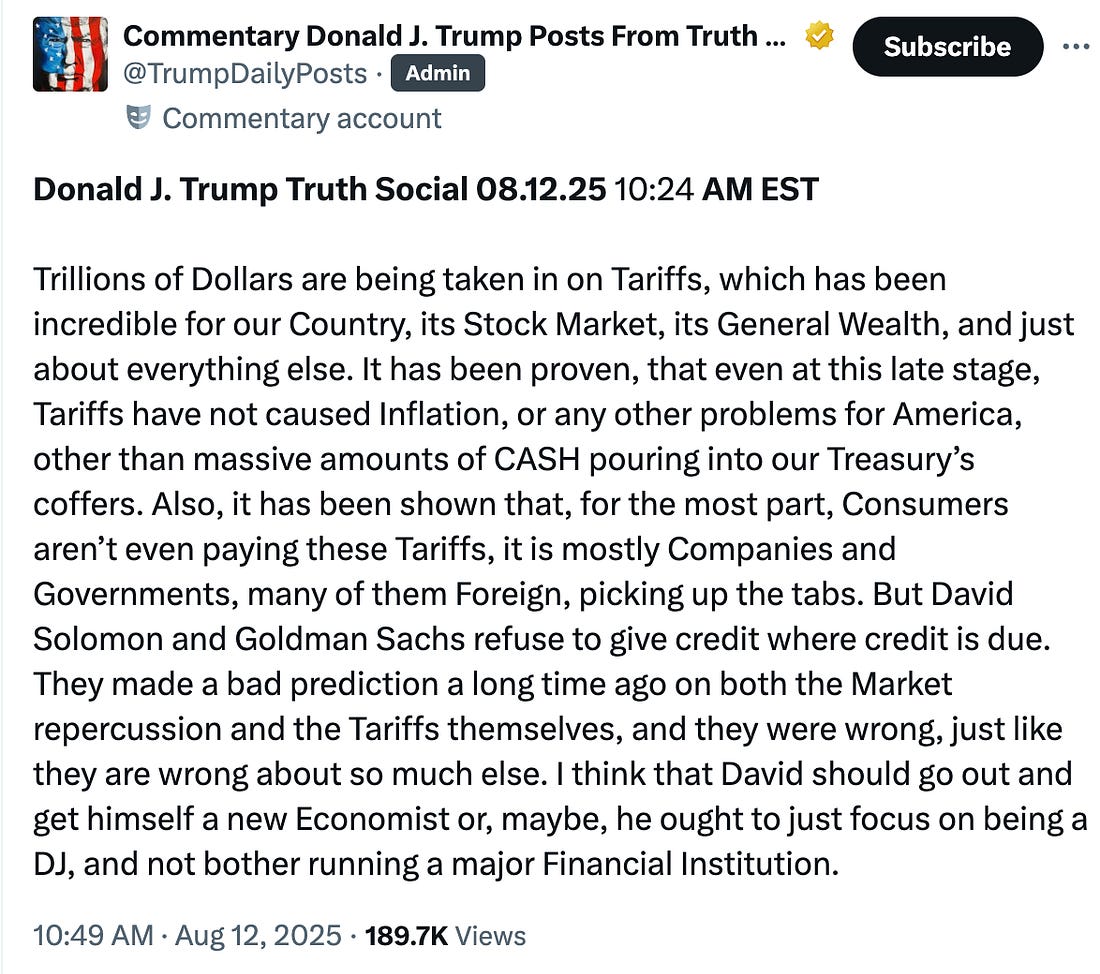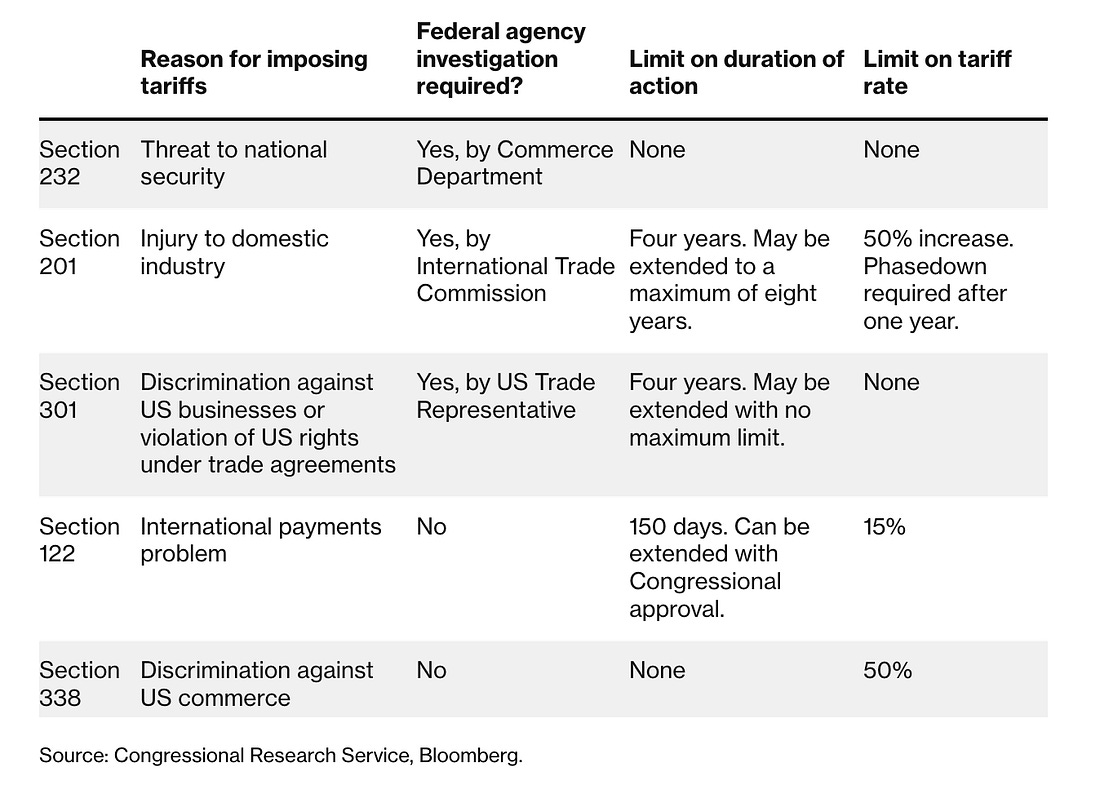Trump Tariff Trouble
His doublethink may be too much even for the supine Supremes
Polymarket probability that the Trump administration will win the tariff case
On April 2 — “Liberation Day” — Donald Trump imposed huge tariffs on scores of countries, including our closest allies as well as islands inhabited only by penguins. In one fell swoop he reversed 90 years of U.S. trade liberalization and violated solemn international agreements. Trump didn’t try to get his tariffs enacted by Congress (which, compliant as Republicans are, wouldn’t have passed them.) Instead he imposed tariffs by executive fiat, invoking the 1977 International Emergency Economic Powers Act — a law that was clearly intended to respond to, you know, emergencies. It was clearly not intended to bestow upon the president the right to do whatever he wants.
A number of states and private businesses quickly filed suit, on the grounds that the tariffs were illegitimate. On May 29 the U.S. Court of International Trade, which normally adjudicates tariff disputes, agreed with the plaintiffs. The administration appealed the ruling to another court, which backed the trade court’s ruling but allowed the tariffs to remain in place pending review by the Supreme Court, which finally held oral arguments Wednesday.
How is it going for Trump’s tariffs before the Supreme Court? I’m not an enthusiast for prediction markets because they basically just summarize conventional wisdom. But tracking conventional wisdom is sometimes useful. And the prediction markets’ verdict on Wednesday’s hearing, shown at the top of this post, was clear: it was a disaster for the administration’s case.
So Trump’s signature economic policy may soon melt down into a puddle of incompetence and humiliation. If that should happen, I will celebrate both the end of an extraordinarily bad policy and the Supreme Court’s willingness to (finally!) check Trump’s authoritarian behavior.
Yet I am somewhat disappointed with the specific grounds upon which the Supremes appear to be resting their arguments against the Trump tariffs. They have so far focused on the fact that tariffs are taxes, and that the Constitution specifically gives taxing authority to Congress and not the president. Fair point.
But the Court for International Trade, in their ruling against the Trump tariffs, made a different argument. The Emergency Powers Act only empowers the president to act in response to economic emergencies. And while the White House has declared two such emergencies —trade deficits and fentanyl — the CIT found that neither declaration provided a plausible rationale for the actual tariffs Trump imposed.
More broadly, supporting Trump’s tariffs requires engaging in doublethink. You have to believe Trump’s assertions that everything is wonderful, that this is the best economy ever. But you also have to believe that we’re facing an economic emergency that justifies massive tariff increases, hitting almost every nation and abrogating generations’ worth of international agreements. Justice Kagan came close to acknowledging this doublethink by caustically saying “It turns out we’re in emergencies all the time.”
But the prize for doublethink surely went to Trump’s pitiful Solicitor General, John Sauer. With the Justices suggesting that Trump’s tariffs infringe on Congress’s unique right to set tax rates, Sauer declared that “they are not revenue-raising tariffs”. That’s essentially an impossible position to argue, given that Trump has constantly boasted about the enormous revenue being raised by the tariffs:
So the tariffs are legal because they aren’t revenue-raising; also, look at how much revenue they’re raising! The fact that Trump’s own statements completely contradict his lawyers’ arguments explains why even a Supreme Court that normally bends itself into a pretzel to ratify administration policies will probably find his “emergency” tariffs a pretzel too far.
If they do, it will be a humiliating defeat for Trump. It will also create enormous uncertainty. For Trump won’t give up. Instead, he has already promised that he will try to reimpose the tariffs by using — or, actually, abusing — different legal avenues.
There are a number of such avenues. U.S. trade law gives presidents considerable discretion to impose tariffs without Congressional approval. Why? Because there are times when the economic or political pressure to deviate from existing tariffs is overwhelming — for example, when a flood of motorcycle imports from Japan threatened to put Harley-Davidson, an American icon, out of business. So the law provides for “pressure release valves” that can give industries time to adjust and tempers time to cool. Bloomberg has a good summary of the options:
Trump has been especially fond of Section 232, invoking “national security” as a reason for tariffs on quite a few items that don’t seem especially tied to strategic defense. For example,
Beginning October 14, the Trump administration will impose a 10 percent tariff on softwood timber and lumber and a 25 percent tariff on upholstered wooden furniture and kitchen cabinets. On January 1, the levies on upholstered furniture — such as couches, sofas, and chairs—will rise to 30 percent and kitchen cabinets will see an increase to 50 percent. [Emphasis mine]
Indeed. Imagine what would happen if we were to get involved in a global conflict and were dependent on China for our crucial supplies of love seats and bathroom vanities!
The potential for Trump to declare faux national threats is why I am uncomfortable with the Supreme Court ruling against Trump’s IEEPA tariffs on the basis of the constitutional right to levy taxes. With a president as unscrupulous as Trump, we need a precedent against imposing tariffs on the basis of obviously false claims of national emergency.
Nevertheless, let’s hope that Trump will soon be handed a major humiliation on his tariffs by the Supreme Court. Regardless of the grounds upon which you object, these tariffs are bad for Americans and bad for the rest of the world. Moreover, the politics and optics are important. Like strongmen in other countries, Trump is trying to consolidate autocratic power. Every defeat he suffers helps undermine the “resistance is futile” mentality that is an essential part of such consolidations.
So if Trump does take a big L here, I will break out the (domestic) champagne.
Substack.com |







